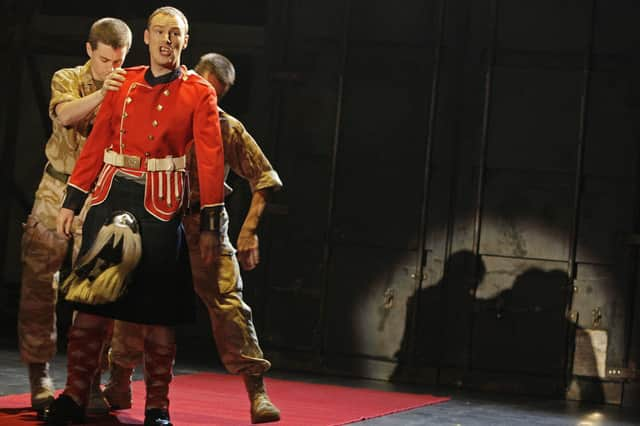SNP and Labour's attempts to destroy each other leaves 'Middle Scotland' in despair – Joyce McMillan


At first, of course, Labour seemed like the easy winner; the party that, with its Liberal Democrat allies, had delivered devolution, and that had adopted some unusually radical and forward-looking constitutional positions – for example on electoral systems and gender balance – in order to do so.
I can, though, remember the exact moment when I realised that the Labour honeymoon of devolution was over; and it came during the Edinburgh Festival of 2006, at the world premier of the new National Theatre of Scotland’s acclaimed Iraq War show, Black Watch. The crowd assembled in the Forrest Road Drill Hall was a notably mixed bunch of Black Watch veterans and dignitaries, ordinary Fringe-goers, and arts professionals; and while the actors donned sunglasses to play a group of Scottish soldiers watching the Americans bomb hell out of Fallujah, the big screens on stage showed the then Labour Defence Secretary Geoff Hoon defending the US/British operation in Iraq, followed by Alex Salmond, the SNP leader, denouncing it as “unpardonable folly”.
Advertisement
Hide AdAdvertisement
Hide AdWith one voice, the audience booed Geoff Hoon, and cheered Alex Salmond to the echo; and I realised that a seismic shift was under way, and that Salmond’s careful but relentless positioning of the SNP, just to the left of the Blairite Labour Party, was beginning to pay off. As the Black Watch incident demonstrated, there were significant differences between the parties, beyond their basic disagreement over independence; notably over defence and nuclear disarmament.
Yet on all matters social and economic, the whole point about this shift of “middle Scotland” towards the SNP lay in the extent to which the party seemed to offer a similar social-democratic prospectus to Labour. Even today, to read through the Scottish Labour Party’s 2021 Scottish election manifesto is to read page after page of social and economic policy with which few in the SNP or the Green Party could disagree; and it’s hardly surprising that when Anas Sarwar confronts Nicola Sturgeon in the Scottish Parliament, the questions are very rarely about policy, and almost always about failures of implementation, and claims that Labour would somehow do the same things, but better.
Yet despite the vast areas of agreement between these twin inheritors of the Scottish social democratic tradition, relations between them are so bitter, and sometimes vicious, that it is difficult to recognise either party in the caricatures produced by the other. There are many diehard independence supporters, for example who regularly churn out the line that Labour is “just as bad as the Tories”, although both the history of the Labour Party, and its present policies however cautious, render that claim plainly ridiculous; and sometimes, their language about Labour politicians becomes highly personal, hate-filled, and unacceptable.
As for the rhetoric on the other side – well, this past week, since the Supreme Court judgment, has provided many examples of the inability of some on the Labour side to talk civilly about the SNP’s independence aspirations, and the tendency for their argument that they would govern better to deteriorate into exaggerated personal attacks on the First Minister and her supposed character.
And the point about this escalating war of words between the SNP and Labour is that no matter how much knockabout fun it is for politicians themselves, for political journalists, and for those hard-line supporters who enjoy baiting one another on social media, most ordinary Scottish voters actively dislike it – particularly when it leads to nonsense like the present situation on local authorities including Edinburgh City Council, where Labour and SNP politicians can be seen reaching fragile “arrangements” with parties with whom they agree on nothing, purely in order to spite one another.
Time and again – in a country where the Tories have not won an election since 1955 – the largest single bloc of Scottish voters can be found choosing the party that offers the best chance of seeing off the extreme forms of Toryism under which we have suffered too much since 1979, and returning to some kind of 21st century social democracy. This means there is a fair chance that some will return to the Labour fold in the next UK general election; but no chance at all that mere fear of independence will stop them from viewing the SNP as a viable alternative, whenever Labour’s attempts to achieve social democracy at UK level begin to hit the rocks.
And beyond that, it’s worth recognising that in a world increasingly beset by existential threats, and real hard-right movements of a frightening character, it is fast become an unaffordable self-indulgence for parties which agree on the basic norms of human rights, democracy, social justice and progressive internationalism to waste energy trying to destroy one another, instead of seeking out the common ground on which we can make progress towards sustainable democratic future.
It may be futile, in other words, to ask Labour and the SNP to co-operate amicably at the moment, as they memorably did in winning the huge 75 per cent devolution referendum victory of 1997. Yet both parties would be wise to remember that the biggest single group of Scottish voters are not interested in their tribal disputes, or in the sight of social democrats trashing each other for short-term electoral advantage. They will remain focussed on the aim of achieving a decent, sustainable social-democratic future; and will vote for whichever party seems most likely to take them there, with some speed, a real sense of integrity, and a serious focus on the task in hand.
Comments
Want to join the conversation? Please or to comment on this article.
